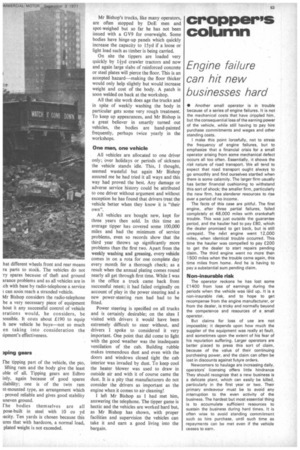cropper's column
Page 65

If you've noticed an error in this article please click here to report it so we can fix it.
Engine failure can hit new businesses hard
• Another small operator is in trouble because of a series of engine failures. It is not the mechanical costs that have crippled him, but the consequential loss of the earning power of the vehicle, while still having to pay hire purchase commitments and wages and other standing costs.
I make this point forcefully, not to stress the frequency of engine failures, but to emphasize that a financial crisis for a small operator arising from some mechanical defect occurs all too often. Essentially, it shows the risk nature of road transport. We all tend to expect that road transport ought always to go smoothly and find ourselves startled when there is some calamity. The larger firm usually has better financial cushioning to withstand this sort of shock; the smaller firm, particularly the new firm, has slenderer resources to rise over a period of no income.
The facts of this case are pitiful. The first engine, after three partial failures, failed completely at 48,000 miles with crankshaft trouble. This was just outside the guarantee period, and the haulier had to pay £80, which the dealer promised to get back, but is still unrepaid. The nixt engine went 12,000 miles, when identical trouble occurred. This time the haulier was compelled to pay £200 to get the dealer to start repairs pending claim. The third engine went no more than 1500 miles when the trouble came again, this time miles from home. And he is having to pay a substantial sum pending claim.
Non-insurable risk
The operator reckons he has lost some £1400 from loss of earnings during the periods when the vehicle was laid up. It is a non-insurable risk, and to hope to get recompense from the engine manufacturer, or from the dealer, is tricky and normally beyond the competence and resources of a small operator.
But claims for loss of use are not impossible; it depends upon how much the supplier of the equipment was really at fault, and sometimes upon the extent of his fear of his reputation suffering. Larger operators are better placed to press this sort of claim, because of the value of their continuing purchasing power, and the claim can often be lost in discounts against futyre orders.
Newcomers to haulage are increasing daily, operators' licensing offers little hindrance They should recognize that a new business is a delicate plant, which can easily be killed, particularly in the first year or two. Their primary endeavour must be to avoid any interruption to the even activity of the business. The hardest but most essential thing is to accumulate sufficient resources to sustain the business during hard times. It is often wise to avoid standing commitment such as hire purchase, until such time as repayments can be met even if the vehicle ceases to earn.










































































































































